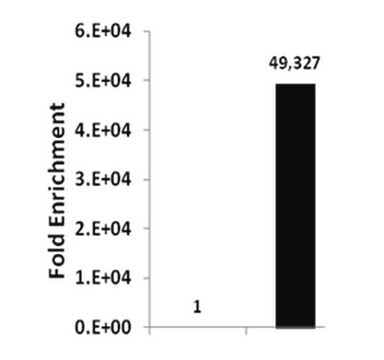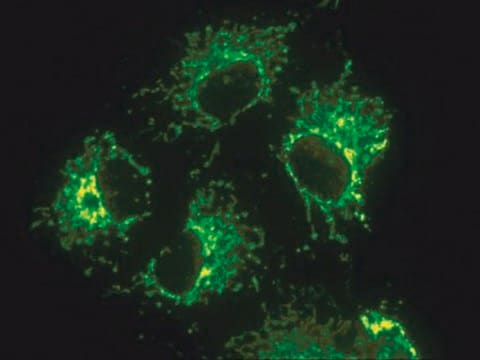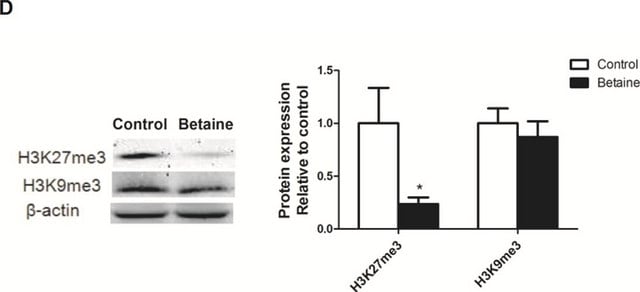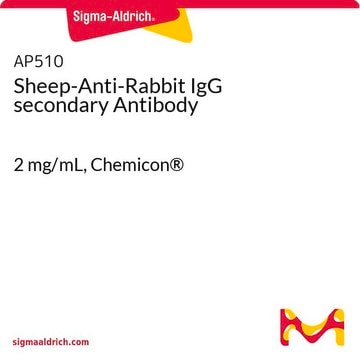17-10489
ChIPAb+ Androgen Receptor- ChIP Validated Antibody and Primer Set
from rabbit, purified by affinity chromatography
Synonym(s):
Dihydrotestosterone receptor, Nuclear receptor subfamily 3 group C member 4, DHTR, NR3C4, AR
About This Item
Recommended Products
biological source
rabbit
Quality Level
clone
polyclonal
purified by
affinity chromatography
species reactivity
rat, amphibian, bovine, human, mouse, chicken
manufacturer/tradename
ChIPAb+
Upstate®
technique(s)
ChIP: suitable
immunohistochemistry: suitable
immunoprecipitation (IP): suitable
western blot: suitable
NCBI accession no.
UniProt accession no.
shipped in
dry ice
General description
The ChIPAb+ Androgen Receptor set includes the Androgen Receptor antibody, a Normal Rabbit IgG, and control primers which amplify a 85 bp region of the human prostate specific antigen (PSA) enhancer region. The Androgen Receptor antibody and negative controls are supplied in a scalable "per ChIP" reaction size and can be used to functionally validate the precipitation of Androgen Receptor associated chromatin.
Specificity
Immunogen
Application
LNCaP cells were hormone starved for 72 hours, then induced overnight with 1 µM CI-4AS-1. ChIP was performed using ~1e5 cell equivalents per IP using 1 µg of either Normal Rabbit IgG (Part No. PP64B), or 1 µg Anti-Androgen Receptor (Part No.CS207339) and the Magna ChIP HiSens (Cat. # 17-10460). Successful immunoprecipitation of androgen receptor associated DNA fragments was verified by qPCR using ChIP Primers, PSA (Part No. CS207340) as a positive locus, and GAPDH Promoter (Part No. 22-004) as a negative locus. Data are presented as percent input of each IP sample relative to input chromatin for each amplicon and ChIP sample as indicated.
Please refer to the Magna ChIP HiSens (Cat. # 17-10460) or EZ-MagnaChIP HiSens(Cat. # 17-10461) protocol for experimental details.
Chromatin Immunoprecipitation:
LNCaP cells were hormone starved for 72 hours, then induced overnight with vehicle (untreated) or 1 µM CI-4AS-1 (treated). ChIP was performed using ~ 1e5 cell equivalents per IP using 3 µg of either Normal Rabbit IgG (Part No.PP64B ), or 3 µg Anti-Androgen Receptor (Part No.CS207339) and the Magna ChIP HiSens Kit (Cat. # 17-10460). Successful immunoprecipitation of androgen receptor associated DNA fragments was verified by qPCR using ChIP Primers, PSA (Part No. CS207340) and the negative locus was the HNRP2AB1 primer set. Delta delta Ct calculations reporting fold enrichment at the positive locus over the negative locus are reported.
Please refer to the MagnaChIP HiSens (Cat. # 17-10460) or EZ-MagnaChIP HiSens (Cat. # 17-10461) protocol for experimental details.
Western Blot Analysis:
A 1:200-1:500 dilution of this antibody detected Androgen Receptor in RIPA lysates from 20 μg of human LNCaP cells.
Immunoprecipitation:
A representative lot immunoprecipitated Androgen Receptor from 500 μg of LNCaP RIPA lysate.
Immunocytochemistry:
A 1:50 dilution of a representative lot showed positive immunostaining for Androgen Receptor in LNCaP cells fixed with 2% formaldehyde/5% acetic acid and permeabilized with 0.1% Triton X-100.
Epigenetics & Nuclear Function
Transcription Factors
Packaging
Quality
Sonicated chromatin prepared from hormone starved (72H), then induced (1 µM CI-4AS-1) overnight LNCaP cells (~1e5 cell equivalents per IP) were subjected to chromatin immunoprecipitation using 1 µg of either Normal Rabbit IgG (Part No. PP64B), or 1 µg Anti-Androgen Receptor (Part No.CS207339) and the Magna ChIP® HiSens Kit (Cat. # 17-10460). Successful immunoprecipitation of androgen receptor associated DNA fragments was verified by qPCR using ChIP Primers, PSA (Part No. CS207340).
Please refer to the MagnaChIP HiSens (Cat. # 17-10460) or EZ-MagnaChIP HiSens (Cat. # 17-10461) protocol for experimental details.
Physical form
Normal Rabbit IgG, Part No. PP64B. One vial containing 125 µg (1.0 µg/ µL) Rabbit IgG in 125 µL storage buffer containing 0.05% sodium azide. Store at -20°C.
ChIP Primers, PSA. Part No. CS207340. One vial containing 75 μL of 5 μM of each primer specific for human prostate-specific antigen enhancer region. (chr19:51354179+51354263, hg19 build) Store at -20°C.
FOR: 5’ GCC TGG ATC TGA GAG AGA TAT CAT C 3’
REV: 5’ ACA CCT TTT TTT TTC TGG ATT GTT G 3’
Storage and Stability
Analysis Note
Includes normal rabbit IgG and primers specific for prostate-specific antigen (PSA) enhancer region.
Legal Information
Disclaimer
Storage Class Code
10 - Combustible liquids
Certificates of Analysis (COA)
Search for Certificates of Analysis (COA) by entering the products Lot/Batch Number. Lot and Batch Numbers can be found on a product’s label following the words ‘Lot’ or ‘Batch’.
Already Own This Product?
Find documentation for the products that you have recently purchased in the Document Library.
Our team of scientists has experience in all areas of research including Life Science, Material Science, Chemical Synthesis, Chromatography, Analytical and many others.
Contact Technical Service








